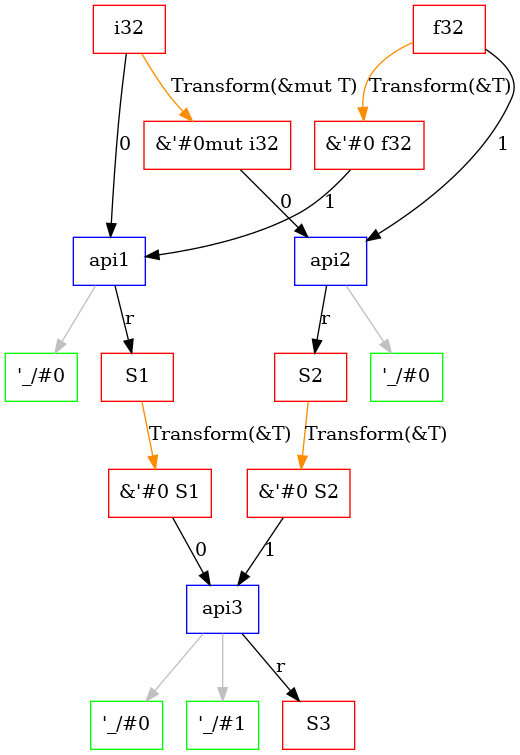Chapter 5.2. API-Dependency Graph
Overview
The API Dependency Graph is a directed graph structure that models dependencies among APIs, types, and generic parameters by traversing the APIs within a Rust library or crate. It contains three types of nodes: API, type and generic parameter. And it contains four types of edges : Arg(usize, recording the location in API parameter), Ret, Generic and Transform(TransformKind, recording the relation between types, such as T and &T, &mut T). Now this module is still under development and generic is not supported.
Use the following example to demonstrate this graph structure.
#![allow(unused)] fn main() { pub struct S1 { pub a: i32, pub b: f32, } pub struct S2 { pub a: i32, pub b: f32, } pub struct S3 { pub a: i32, pub b: f32, } pub fn api1(arg1: i32, arg2: &f32) -> S1 { S1 { a: arg1, b: *arg2 } } pub fn api2(arg1: &mut i32, arg2: f32) -> S2{ S2 { a: *arg1, b: arg2 } } pub fn api3(arg1: &S1, arg2: &S2) -> S3{ S3 { a: arg1.a, b: arg2.b } } }
By scanning the code above, we generate an API Dependency Graph like this:

Quick Usage Guide
If your project doesn't have a rust-toolchain.toml, you need to create such a file contains the following content:
[toolchain]
# The default version of the rustc compiler
channel = "nightly-2024-10-12"
components = ["rustc-dev", "rust-src", "llvm-tools-preview"]
We use this feature for generating fuzz targets about library APIs. You can use this feature with the following command(Make sure you are in a cargo project):
cargo rapx -testgen
This command will analyse your project and gengerate a .dot file in the current directory, which contains the API dependency graph information, and also generate a new project in the parent directory. The new project is a fuzz target that contains APIs in your project.You can visualize this graph by using one of the following commands.
dot -Tsvg your_crate_name.dot -o api_graph.svg
dot -Tpng your_crate_name.dot -o api_graph.png
To utilize the analysis results, you can use the module as follows:
#![allow(unused)] fn main() { use analysis::core::api_dep; // Import the module let api_graph = api_dep::ApiDep::new(tcx).start(true) // true: collect only pub APIs; false: collect all APIs }
The above codes can generate an API dependency graph based on your crate.
Graph APIs
The ApiDepGraph struct provides several APIs for interacting with the dependency graph. Below are the key methods. Before using these APIs, you need to import relevent module:
#![allow(unused)] fn main() { use analysis::core::api_dep::graph; // Import the module }
statistics
Returns statistics about the graph, including counts of API nodes, type nodes, generic parameter nodes, and edges.
#![allow(unused)] fn main() { // Here is the definition of Statistics pub struct Statistics { pub api_count: usize, pub type_count: usize, pub generic_param_count: usize, pub edge_cnt: usize, } pub fn statistics(&self) -> Statistics }
inner_graph
Returns reference of the graph data.
#![allow(unused)] fn main() { pub fn inner_graph(&self) -> &InnerGraph<'tcx> // InnerGraph is Graph<DepNode<'tcx>, DepEdge> }
provider_tys
Returns a list of types that can be transformed into the ty type.
#![allow(unused)] fn main() { pub fn provider_tys(&self, ty: Ty<'tcx>) -> Vec<Ty<'tcx>> }
all_transform_for
Returns all transformation kinds applicable to the specified type.
#![allow(unused)] fn main() { pub fn all_transform_for(&self, ty: Ty<'tcx>) -> Vec<TransformKind> }
get_node
Retrieves or creates a node index for a given DepNode. If node doesn't exist in graph, it will add this node into the graph and return it's NodeIndex.
#![allow(unused)] fn main() { pub fn get_node(&mut self, node: DepNode<'tcx>) -> NodeIndex }
get_index_by_node
Given a DepNode, returns Option<Nodeindex>, cause it may not exist in the graph
#![allow(unused)] fn main() { pub fn get_index_by_node(&self, node: DepNode<'tcx>) -> Option<NodeIndex> }
The feature is based on our RuMono paper, which was published in TOSEM.
@article{zhangrumono,
title={RuMono: Fuzz Driver Synthesis for Rust Generic APIs},
author={Zhang, Yehong and Wu, Jun and Xu, Hui},
journal={ACM Transactions on Software Engineering and Methodology},
publisher={ACM New York, NY}
}